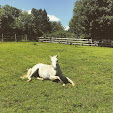After my conversion, I got to co-lead the seder and might, in the near future, have the opportunity to host one at home. With that in mind, I started investigating haggadot to supplement the Maxwell House one, which is primarily valued for being giving out for free in large quantities. I wanted something with interesting commentaries and parallels to modern struggles for freedom in the world. Something that would inspire celebration of our liberation rather than the feeling that we were enslaved to the haggadah.
So I went out to the Brandeis library, confident that their very large Judaica section would have a great selection of haggadot. I was right, in that there was a great number of old, musty haggadot. An overwhelming number were only in Hebrew, which would only make things more difficult. I did find an intriguing one with a lot of commentary in English, but the ratio of commentary to text made it impractical for leading a seder. The women's passover companion was a collection of essays, and the women's haggadah I found had excised almost all of the original Hebrew text, leaving only touchy-feely English. I've come to the conclusion that the haggadah I would use at a seder has to be made with extracts from several sources, and would require more labor than skimming the Judaica section of the Brandeis library.

No comments:
Post a Comment